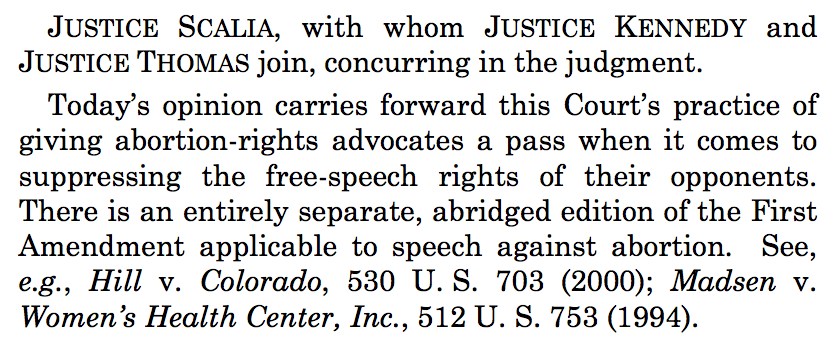Well, sort of.
It’s been a pretty good day for the Constitution all around. Among the good news is the court’s unanimous ruling that Massachusetts went too far by creating 35-foot buffer zones around abortion clinics to keep demonstrators away from consumers. “Petitioners wish to converse with their fellow citizens about an important subject on the public streets and sidewalks — sites that have hosted discussions about the issues of the day throughout history,” wrote a sensible John Roberts. The problem is that the court did not go nearly far enough in its narrowly tailored decision, because the ability of the state to single out pro-choice advocates has not changed.
Supreme Court decides in McCullen v. Coakley that clinic buffer zones are unconstitutional. One more attack on women’s rights.
— Sandra Fluke (@SandraFluke) June 26, 2014
Still, it’s somewhat heartening to see the Supreme Court reaffirming that free speech is more vital to a liberal democracy than making sure no one has any hurt feelings. In our dying patriarchy, women will no longer be shielded from the vigorous debates and disputes of the day in Massachusetts. Surely feminists must rejoicing . The challenge, after all, was brought by a woman who was quietly approaching other woman and engaging them in a discussion. Since feminists are in favor of “choice,” surely this can’t be offensive to them.
If somebody can explain to me how this doesn’t make abortion more dangerous for women, I’d love to know: http://t.co/MjufZK6pbY
— Ron Fournier (@ron_fournier) June 26, 2014
Now, there is always government interest in public safety, which is ostensibly the purpose of erecting free speech restrictions around abortion clinics (and only abortion clinics). The genuine purpose of these buffers is to shelter people from feelings of unease, guilt or embarrassment when they are confronted. How this makes the abortion more “dangerous” for women, as supporters claim, is confusing. It is against the law to impede a person wishing to enter an establishment. It is against the law to physically assault someone (other than a fetus that is). It is against the law to damage private property. It is against the law to harass someone – and by “harass” I am referring to the legal definition not the definition offered by abortion clinics, which is often simply “inconvenience.” It is not yet against the law to remind them what they are doing, or convince them not to enter or to posit that a doctor inside is in the process of ending human life.
And in case anyone is wondering, I don’t believe there should be any such limits on the Westboro Baptist Church bozos at funerals or the those angry union guys who lug that giant inflatable rat around NYC to try to drive consumers away – or anyone else, for that matter. The problem here is that the court didn’t go far enough. As the conservative judges argued, the very existence of the Massachusetts law is discriminatory because it based on demonstrators’ viewpoints. And as Justice Samuel Alito points out, “Speech in favor of the clinic and its work by employees and agents is permitted; speech criticizing the clinic and its work is a crime.”
Justice Scalia:

So now, one imagines that states or cities will limit speech by simply offering blanket buffer zones for all doctors, or all storefronts. Or in other words, for abortion the states may end up limiting everyone’s free speech rights. Let’s hope that’s not the case.
Follow David Harsanyi on Twitter.









